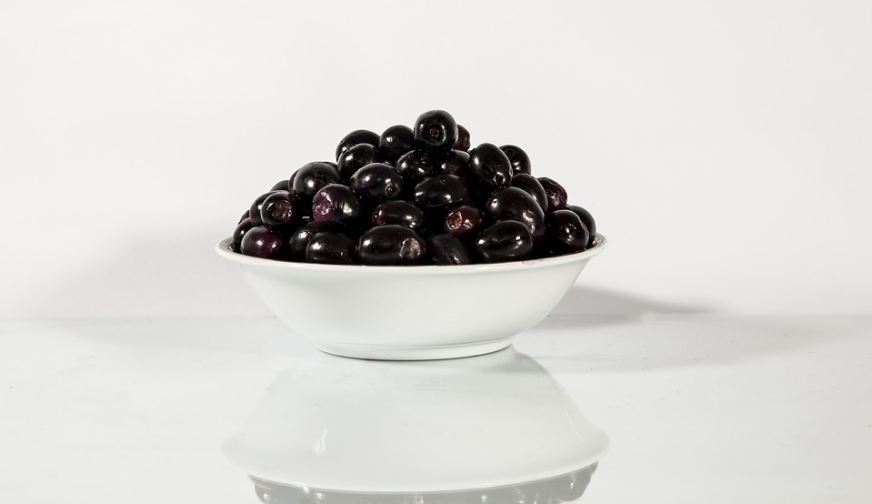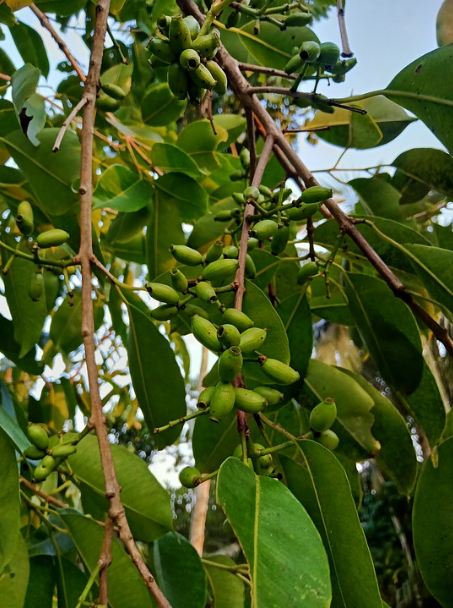What is Jambolan?
Botanically known as SyzygiumCumini, Jambolan is a tropical tree native to the Indian Subcontinent and nearby regions of Southeast Asia. This evergreen tree belongs to the same genus as Clove in the flowering plant family Myrtaceae. Prized for its summer fruit, wood, and sweet-smelling leaves, Jambolan is also referred to as Java plum, black plum, Malabar plum, or Jamun depending on the region.
It is such a fast-growing tree that it is considered an invasive species in some areas of South Africa, the Caribbean, and islands of Hawaii and Oceania. Initially grown only in the Indian subcontinent, it is now cultivated in tropical and subtropical regions around the world, including America, Singapore, Australia, and Hong Kong.
Features of the Jambolan Tree
It grows rapidly and can live more than a hundred years but reaches an optimal height of 30 meters just after forty years. The glossy leaves of this tree have a deep green hue and possess a scent somewhat similar to turpentine. The ripe fruit varies from purple to black in color with a sweet, astringent flavor. It is mostly eaten raw; however, many recipes use the fruit to make sorbets, jams, or even juices.
It holds special religious sacraments in the Hindu religion: it is planted near temples in India, and its fruit is offered to the Hindu deities as a gift. The Jambolan or Java Plum tree is highly versatile in its functionality, with each part, be it the leaves, bark, or fruit, providing a plethora of uses and benefits.
Below, we will be covering everything you need to know about the Jambolan tree, from its numerous health benefits to countless commercial uses.
Commercial Uses of Jambolan Tree
Hardy Bark
The longevity of the Jambola tree is due to its robust bark that can withstand floods and is tolerant to long periods of drought. This water-resistant timbre is often used to make railway sleepers and light furniture. It also plays an important role in installing motors in tube wells and in the construction of village houses.
Nutritious Livestock
The glossy leaves of the Jambolan tree are cultivated for livestock feeding as they are packed with nutrients; however, they can also be grown for ornamental value.
Health Benefits of Jambolan
Aids Diabetic Treatment
The Jambolan tree has long been used in folk medicine to treat diabetes as it possesses hypoglycemic qualities. Ayurvedic medicine, which originated over three thousand years ago in the Indian subcontinent, made frequent use of Jambola seeds to keep the blood sugar levels within normal ranges. Results from modern research have backed this claim: Jambolan seeds help break down the complex starch molecules into simpler sugar molecules, promoting a healthy glycemic response and liver function.
The Jambolan fruit is a superfood for diabetic patients as well as it has a low glycemic index. Doctors recommend consuming jambolan fruit regularly in summers to alleviate diabetic symptoms like thrusting and frequent urination.
The decoction of the Jambolan tree’s bark and seeds is also beneficial in the treatment of glycosuria: it helps lower the level of blood sugar in the urine of glycosuric patients.
Promotes Digestive Health
The Jambolan tree also promotes digestive health by ensuring normal functioning of the gastrointestinal tract. In folk medicine, a decoction of the Jambolan bark is used to keep the gut healthy and functional. It was a tradition in the Indian subcontinent to cook such a decoction with goat milk for children.
Thanks to the Jambolan tree’s carminative qualities, it can also be used to aid the treatment of various digestive orders. Folk medicine often includes jambolan seeds with a combination of other herbs to treat pancreatic diseases, flatulence, dysentery (severe diarrhea), and bowel spasms. Vinegar formed from jambolan fruit is helpful in the treatment of diarrhea and enlargement of the spleen.
Improves Oral Health
The Jambolan tree leaves and bark possess unique antibacterial properties that aid in improving oral health. In ancient times, a decoction of the Jambolan bark was used as a mouthwash due to its antimicrobial action. Due to its astringency, the decoction kills any bacteria or germs found in the mouth, preventing risks of oral problems like ulcers and gingivitis (bleeding gums).
The Jambolan tree leaves are used for their astringency as well: they promote the strengthening of teeth and gum and prevent throat infections. The leaves are dried and burned to make a powder, which is applied to the teeth to keep gum infections and bleeding at bay.
Has Anti-inflammatory Properties
The Jambolan leaves also have anti-inflammatory properties. It can lower the level of inflammation and ulcers on the skin. It can also relieve pain due to swelling or inflammation in the throat or mouth. To relieve pain, apply the leaves directly to the affected region.
A Powerful Aphrodisiac
The Jambolan fruit is a powerful aphrodisiac; many people consume it to stimulate sexual desire and increase interest in sexual activities. Some people also use it as a tonic to heighten the feeling of vigor.
Good for Your Skin
The astringent properties of the Jambolan fruit will help keep skin problems at bay as well. The acidity in the fruit helps control acne, blemishes, and pimples. The Jambolan fruit is also a rich source of vitamin-C – the antioxidant molecule protects the skin against oxidation damage by forming a layer against free radicals present in the environment. A regular intake of Jambolan fruit will keep your skin fresh and healthy!
Side Effects of Jambolan Fruit
Jambolan fruit is generally safe for oral use when taken in usual amounts, and most people do not develop an allergic reaction to it. However, the consumption of jambolan fruit might have an adverse effect on the following conditions:
Pregnant or Breastfeeding
Pregnant or lactating women should refrain from consuming jambolan fruit as, at present, there is not sufficient research to claim it safe for their use. Although it has not proved to be harmful either, it is better to stay on the safe side to avoid risking the health of either your child or your own.
Have a surgery scheduled within two weeks
Since Jambolan fruit has hypoglycemic properties, it can lower blood levels. Doctors have expressed their concern that it might interfere with the blood sugar level during or after the surgery and risk the patient’s health; therefore, consumption of jambolan tree must be put to a halt prior to two weeks before the surgery.
Diabetic Patients
Jambolan seed extracts and bark decoctions can lower blood sugar levels. If you are a diabetic patient, closely monitor how your blood sugar level fluctuates after consuming Jambolan extracts to prevent low blood pressure.
The Takeaway
The astringent Jambolan or Java Plum tree has a myriad of commercial uses and health benefits. Its extracts and decoctions can prove beneficial to diabetic patients. The fruit itself is loaded with nutrition; its regular intake will help you maintain healthy digestive and oral health. Although its oral use is generally safe, it is best to consult your doctor before consuming any Jambolan tree extracts if you are a diabetic patient.


